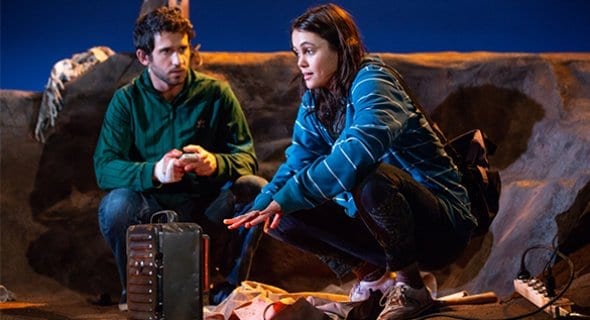NEW YORK — Power Strip is a beautiful and timely look about life at a Greek refugee camp where we meet Yasim, a Syrian refugee played by Dina Shihabi, as she tries to make sense of her life stuck by a power strip, her only connection to the outside world now that she has been forcibly removed from the only home she knew.

I was absolutely thrilled to have the opportunity to review Sylvia Khoury’s work, because as a woman of many hats like Khoury herself, impressive playwright and author who is also in her fourth year in med school, I just finished a dissertation about refugee women and job searching in the United States. It is rare that my worlds of theatre and refugees collide. I am so happy that Khoury is using the platform of theatre to tell the story of challenges of refugee women. The show, while not perfect, was a haunting and accurate tale of how women are forced into an unsafe world of patriarchal rules of war, religion, safety, and society, and how to navigate through those rules when the world that you know comes crashing down around you.
Shihabi as Yasmin captures well the feeling of mistrust and thick skin that I have often seen after years of trauma and war. I was impressed with the hardened nature that Shihabi developed within her character, but I would have loved to see a little more of it reflected within her vocal tone. Her projection was strong, but the Clair Tow theatre space was small enough that she could have utilized more variations as Darius Homayoun as Khaled did. The connection between these two characters was strong, and I enjoyed watching their chemistry build in an organic, realistic way.

As the show progressed, it became apparent through the writing of the double meaning of the title of Power Strip, and the timely discussion of women’s rights is even more powerful in the context of war and survival when often a woman’s body is used as a tool and a weapon. I don’t know if reviews get read by playwrights, but with a subject so dear to my own heart, I have to recommend for any future rewrites using a knowledgeable dramaturg who could research with specific women who have been in refugee camps for multiple perspectives. I can tell this has already been done and done well, but the story could be even more well-rounded and developed.
I also found myself longing for more of an understanding of the back story of the relationship behind Peter, played by Ali Lopez-Sohaili, and Yasim. Why did the characters get together and what exactly was it that made them end it? I understood it was political, but the rest was unclear. I appreciated the direction choices by Tyne Rafaeli, especially the use of silence and space. Set design by Arnulfo Maldonado was also well done, mirroring the myriad stories I have been told of endlessly hopeless nights in refugee camps.
Some of the best writing and delivery in this show comes when Shihabi as Yasim is explaining that throughout Yasim’s life, her body has not belonged to her but has been traded in marriage or used as a tool of war. Other star moments are when Khaled states that he never thought of a shower as an unsafe place or when Khaled and Yasim both reflect that as refugees, they now have to find a new way to live. For hundreds if not thousands of years, certain stories have been played over and over on stage, but now there is an ushering in of a new generation of theater where new playwrights are daring to find the untold stories and are bringing them to audiences. I’m so glad Khoury is telling this story. I hope she keeps refining it and telling it so many more like it.
[box]Power Strip plays at the Claire Tow Theater at the Lincoln Center Theater (150 West 65th Street, New York, New York) through November 17, 2019, daily except Tuesdays at 7 PM with Saturday and Sunday matinees at 2 PM. Tickets are $30. For more information, please visit their website.[/box]
